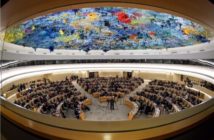OMTC World Organization Against Torture
Rabat,
At the conclusion of a six-day visit to Rabat by a delegation of anti-torture experts, the World Organisation Against Torture (OMCT) calls on the governmental authorities to ensure that the reform process leads to an end to torture and to full accountability. The delegation calls on the authorities to work with civil society to ensure that advances in the constitution, legislation, human rights mechanisms, plans of action and strategic plans, are coupled with adequate measures to ensure the success of such reforms. It is clear to the delegation that the biggest challenge facing the improvement of human rights in Morocco is the difference between the rate of reform and the rate of implementation of the reforms. In this accountability for torture must become a priority.
The OMCT delegation wishes to express its appreciation for the openness of the discussions with different authorities on the reforms required to end any practices of torture and ill treatment. The delegation met with the head of the Inter-ministerial Delegation for Human Rights (DIDH), the head of the Delegation for the Administration of Prisons, and representatives of the National Council on Human Rights (CNDH), the Ministry of Justice and the Ministry of Interior.
The OMCT recognizes improvements of human rights protection made in the 2011 constitution, the creation of the DIDH, the recent steps taken to ratify three optional protocols, including the Optional Protocol to the UN Convention Against Torture (OPCAT), and looks forward to these processes reaching completion. The delegation is encouraged to see that the debate on the creation of a national prevention mechanism is ongoing, as well as discussions on ratifying the Rome Statute of the International Criminal Court. The ratification of the Rome Statute would represent a definitive commitment to combating impunity.
The OMCT supports discussions on moving towards the abolition of the death penalty, and strongly encourages the State to take the next natural step, after having a moratorium in place since 1993, and the project to reduce the number of crimes allowing for the death penalty from 41 to nine. The abolition of the death penalty would represent a monumental step not only for Morocco, but also for the entire region, and would be emblematic of the State’s desire to set a new and historic human rights record. In this regard, the OMCT strongly encourages the government to vote for abolition in the 20 December vote before the General Assembly, as this represents a logical step given the moratorium in place since twenty years.
The decades of focused work on the part of Moroccan NGOs has proven essential to changing Morocco’s human rights record and will be a fundamental condition for further progress. The delegation encourages the Moroccan State to intensify its efforts to partner with civil society not only in developing plans of action to address human rights violations, but also implicating them in the implementation process and allowing it to monitor its progress.
Unfortunately despite the guarantees enshrined in the Constitution and the new mechanisms created to monitor and ensure human rights, the delegation met with several communities that are critical of State, and these communities presented serious allegations that practices of torture and ill-treatment by the police and other law enforcement bodies continue and that impunity for such violations so far remains the rule. The information received confirms serious concerns expressed earlier this year by the UN Special Rapporteur on Torture.
The OMCT invites the authorities to take all steps to address such allegations, give victims and their families detailed responses based on effective and independent investigations, and grant adequate reparations where violations are found.
It is thus vital to ensure that the reform process does not remain a written exercise, but that such reforms reach those individuals in a position to violate human rights, and protect the most vulnerable populations. Particular attention must be paid to the vigilant monitoring of conditions in prisons, police stations, and other centers of detention, as well as measures to ensure the independence of the judiciary, and the proper training of all state officials exercising positions of authority, including the General Office of National Security (DSGN). It is equally vital to ensure a clear separation between law enforcement and intelligence and ensure effective legal and parliamentary oversight over the DSGN.
Background of the OMCT mission:
The delegation was led by Dick Marty, OMCT’s Vice-president, former state prosecutor of the Canton of Ticino, member of the Swiss Council of States and former President of the Legal and Human Rights Committee of the Parliamentary Assembly of the Council of Europe. It also included the OMCT’s Human Rights Officer for the Middle East and North Africa region, Belkis Wille, and was undertaken in cooperation with members of the SOS Torture Network, the Moroccan Organisation for Human Rights (OMDH) and the Association for Human Rights in Morocco (AMDH).
This mission was carried out in the context of the submission of the fourth periodic report of Morocco, which was reviewed by the Committee Against Torture on 1-2 November 2011 in Geneva. The OMCT carried out a mission to Morocco in July 2011. During this visit the OMCT delegation carried out research in order to draft to an alternative report for the Committee. This report was written in collaboration with the Moroccan Committee Against Torture, and with the Moroccan Organisation for Human Rights (OMDH). The report was submitted to the Committee in November 2011, in order to provide the Committee with NGO perspectives to the government’s implementation of the Convention Against Torture (Convention).
This follow-up mission forms part of global efforts led by the OMCT to foster the implementation of the recommendations of the UN Committee Against Torture undertaken with the financial support of the European Union and the Oak Foundation.
For further information:
Belkis Wille in Tunis – bw@omct.org, Tel: +216 22 194 051
.






